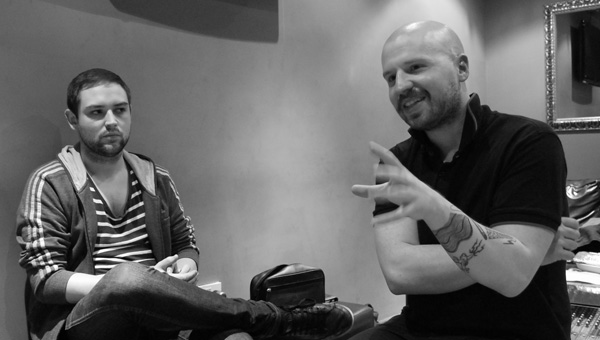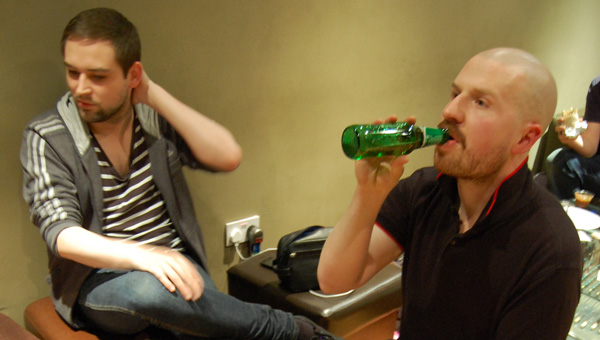The Twilight Sad Interview

The Twilight Sad are another of those post rock bands hailing from the fertile breeding grounds of bonny Scotland. Their new album, No One Can Ever Know, is released next year, so Soundbite Culture had a chat with singer James Graham and guitarist Andy MacFarlane to find out just what it is no one can know.
Soundbite Culture: So, how did you come up with The Twilight Sad as your band name?
Andy MacFarlane: We needed a name and our drummer found it in a Wilfred Owen poem and we were just like, “You know what, we can’t get any better”.
A name’s a name, you know. I mean the first time you hear any band name I always think it sounds stupid. So we just thought fuck it, let’s take that.
James Graham: Aye, it was one of those ones we’re we cannae think of anything better. So this is it.
AMF: We probably should have thought a wee bit longer about it in hindsight.
SC: But it’s all about the music.
AMF: Aye, that’s it.
SC: Going down that same road, your new album’s called No One Can Ever Know. So what is it that no-one can ever know?
JG: No one’s ever gonna know [laughs]. On our last album [Forget The Night Ahead], I thought I spoke about things too much.
SC: You do all the lyrics then?
JG: Yeah, and I kind of thought I wanted to keep everything to myself. A lot of my favourite songs are like that, so you can relate them back to yourself. Sometimes when you hear what a song’s about, it kind of spoils it for you. So this time I’m keeping my cards close to myself
SC: Your new album signals a change in emphasis for your sound. Was that a calculated choice?
AMF: It wasn’t a deliberate thing; we didn’t say “We want to sound like that”. It was just our sound developing over time. We don’t want to rewrite the same album over again; we’d get bored to death of that.
JG : Yeah, if somebody wanted it [No One Can Ever Know] to sound like one of our other albums, they should just listen to that instead, you know. But there was no deliberate discussion between us, we just wrote the songs. It was never a point where we said “We’re trying to be this”.
SC: Changing your style keeps the music fresh for you guys, but do you risk alienating the band established fan base?
AMF: If anything, it would hopefully introduce us to a few more people. That’s the way I would look at it. But the sound isn’t that different, especially when you see it in a live context. It all fits really well together. I think a lot of the time when bands do repeat the same album, it’s because their fans won’t let them move on. You just need to make that step and be confident about it, you know.
JG : I think there are a lot of bands just kicking about who are replicating the same album over and over again.
AMF: Yeah, they find their formula kind of. Well, this has made us x amount of money so let’s do that again.
SC: It’s not about the music, it’s about the money, let’s keep on making the money.
AMF: Some money would be nice though [laughter].
JG: You’re never going to please everybody, wouldn’t matter what you do. When we start writing, if we like it than that’s what we’re going with. We write the music for ourselves, to begin with.
SC: The departure of bassist Craig Orzel has also coincided with your change in musical style. Just coincidence?
AMF: Yes. When we recorded it [No One Can Ever Know] I did all the music, so it wasn’t like we were missing his input.
JG: Andy wrote the bass lines on the first two albums too.
AMF: Yeah, it’s just the way we work. We find it easier if I do all the music and James does all the lyrics.
SC: But you guys have input into each other’s work?
JG: I run my lyrics past Andy, I look at it as a kind of shite filter [laughter]. A lot of people I wouldn’t trust to give this kind of thing to, but he’s quite happy to tell me if I’m terrible or not. We all comment but usually, for some reason, there’s not too many arguments to begin with. It’s just other things we argue over [laughter].
SC: What inspires you to write music?
AMF: Endless amounts. There’s no specific genre or people that we listen to, just tonnes of stuff. As much as people like to pigeonhole sounds, I don’t really like that. Just listen to something for what it is and stop trying to say it sounds like this, that or whatever.
SC: Lazy, music journalists [laughter].
JG: I’ve heard people compare us to so many bands it’s unbelievable, and now because of the new sound there’s gonna be even more.
SC: It is a bit lazy, but any UK band who does a bit of indie rock and electronica are gonna be compared to Depeche Mode.
AMF: Ah, synths used in a guitar band; that’s New Order… no it’s not.
SC: I know from my own experience that I find myself listening to different kinds of music as I get older. Is that the same for you, that you’re listening to different things now than say 2 or 3 years ago and maybe this has played a part in your evolving sound?
AMF: I suppose recently I have been listening to a lot of early electronic music from the sixties to the eighties, when it really started. These days, I cannae really find anything much to listen to. That’s why I’m always going back, trying to go through everything else without going forward.
SC: Rediscovering all these great old things, which are still new to people who come to it afterwards. Personally speaking, I don’t think there’s a lot of interesting or great new music out there.
AMF: Yeah, I feel the same.
JG: I still listen to the same things I’ve always listened to, I’ve not changed anything. Whereas Andy changes his music, I just always listen to the same old stuff. I’ve not changed anything about the way I write, from my first song to the last one.
SC: Well, it’s good that Andy’s in charge of the music then [laughter]. But I imagine, as you’re responsible for lyrics, you read different things now?
JG: Ah, no. Stuart {Braithwaite] from Mogwai said to me, “I need to give you this book”. And I was like “I’ve only read two books in my life”. He was like “What?!” and nearly threw me out of the building.
I just write about things that happen to me, personal things. I don’t really take any inspiration from literature or anything like that, just because as far as the lyrics go I want them to be honest. I want to, well, just get this stuff off my chest to begin with, but then if it connects to people than that’s great. And if it’s honest, there you go. If you’re not honest, then you’re contrived in a way. Yeah, so I don’t read.

SC: I’ve read a few different reviews of your live shows, which reference your “wall of sound” dynamic. Do you think this will change as your music changes?
AMF: It just really kind of flows now. There’s a big wall of noise or whatever, and then it will break up with the electronic stuff. But a lot of the sounds I’m making are pretty discordant, so it keeps that energy there just as our older sound. It works well, because it’s not really contrasting stuff.
SC: So you’re playing older material with the songs from No One Can Ever Know?
JG: We’re playing pretty much the same amount of songs from each album. I think the live sets are a lot more dynamic now than they were before, and the reaction from the people who’ve been coming to see us is their ears are still ringing. I’m not surprised, because mine have been ringing for the past week [laughter].
SC: The new material still has that same energy as previous Twilight Sad albums then?
JG: Yeah, the new stuff’s still pretty in your face. I think it comes across just as intense as the old stuff, but it helps it flow more I think. I’m enjoying playing live more now with these new songs.
SC: And the fans are taking to your new songs?
JG: Aye. I can never tell because I don’t really look out into the crowd. I find that pretty hard to do. I just get lost in my own little world and then Andy’ll tell me how people are reacting.
AMF: I don’t look at them either. I hate it when you look out and make eye contact with somebody, then I don’t know where to look [laughter].
SC: Is it a strange thing, to be up on stage in front of hundreds or thousands of people?
JG: To begin with, yeah. For me.
SC: As the focal point of the band, everyone’s going to be looking at you.
JG: And I definitely wasn’t too comfortable with that. But as we’ve gone along, it’s become a lot more natural to me. I mean, we played three gigs in three years and then we got signed. And the label pushed us in America and we hadn’t even played Edinburgh yet.
SC: How difficult was that?
AMF: We were still trying to mix the album and what to make it sound like. And we didn’t know what to sound like live either. We were getting so drunk and just hoping that something worked. I think it was because we got so drunk that we kept on turning everything up and up. Aye, maybe that’s where our wall of sound came from [laughter].
JG: It was pretty chaotic the first couple of years, we were thrown in at the deep end.
SC: But fantastic, right, to be signed after just three gigs?
JG: I wouldn’t have had it any other way, I’m glad it happened the way it did. But at the same time there were a few learning curves, we definitely got our wrists slapped a few times.
SC: No One Can Ever Know is out in February, so I imagine you’re looking forward to pushing that.
JG: Aye, and touring that as much as possible. With our last album we didn’t do that because of circumstances. But with this one, I feel like we should be out basically working our arses off. Constantly on the road. We’ll definitely not fall out [laughter]. It’ll all be rosy by the end though.
It’s definitely nerve-wracking before we release every new album, but the thing is we’re all really proud and confident about this one.
SC: Is there anything you hope to achieve with this?
AMF: I suppose it would be good to get a wider audience, but you think that about everything you write. Just wait and see what happens.
JG: Ah, you never know. The band has had steady progress between the albums, so if we can just keep on going forward and gaining more fans with every album. Think we always knew from day one it would be a lot of work.
AMF: It’s better to make it gradually, I think.
JG: And If you work hard for something you appreciate it a lot more. Aye, we’re putting the work in and, fingers crossed, we can just keep on doing it. To be honest, can’t really ask for much more than to be able to keep doing this.
No One Can Ever Know is out on February 6th.
Interview by Jonathan Campbell; Photography by Tim Green